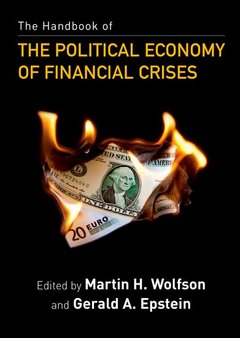Description
The Handbook of the Political Economy of Financial Crises
Coordinators: Wolfson Martin H., Epstein Gerald A.
Language: English
Subject for The Handbook of the Political Economy of Financial Crises:
Publication date: 07-2015
Support: Print on demand
Support: Print on demand
Description
/li>Biography
/li>
The Great Financial Crisis that began in 2007 reminds us with devastating force that financial instability and crises are endemic to capitalist economies, and that it is only strong and dynamically-changing financial regulations that can keep the damage caused by these crises within bounds. The international financial system and individual national economies, including that of the United States, are suffering from the aftermath of the worst financial crisis since the Great Depression. Economists are struggling to understand the origins and implications of the crisis. The Handbook of the Political Economy of Financial Crises uses a political economy theoretical framework to analyze the crisis. After an opening chapter that describes the dimensions of the current crisis, the next section provides relevant theoretical frameworks. Subsequent sections apply these theoretical frameworks to analyze the background, dimensions, and implications of the crisis for the world economy. Leading scholars push forward our understanding of how and why our international and domestic economies are susceptible to financial breakdown and what can be done to mitigate this problem in the future. The methodology throughout applies theoretical concepts in the context of an historical and institutional understanding of the real world. By emphasizing the historical and institutional aspects of financial crises, the authors advance economic knowledge and provide insights into how we can manage our financial system to improve the lives of ordinary people.
Martin H. Wolfson is the Director of the Higgins Labor Studies Program. He teaches economics at the University of Notre Dame. Before teaching, he was an economist at the Federal Reserve Board in Washington, D.C. He is a member of the Board of Directors of the Community Forum for Economic Development, an organization that promotes social and economic equity and increased living standards of local residents. Gerald A. Epstein is Professor of Economics and a founding Co-Director of the Political Economy Research Institute at the University of Massachusetts Amherst. He is the co-founder of SAFER, a group of economists and other analysts who participate in the debate over financial reform in the United States.
© 2024 LAVOISIER S.A.S.




